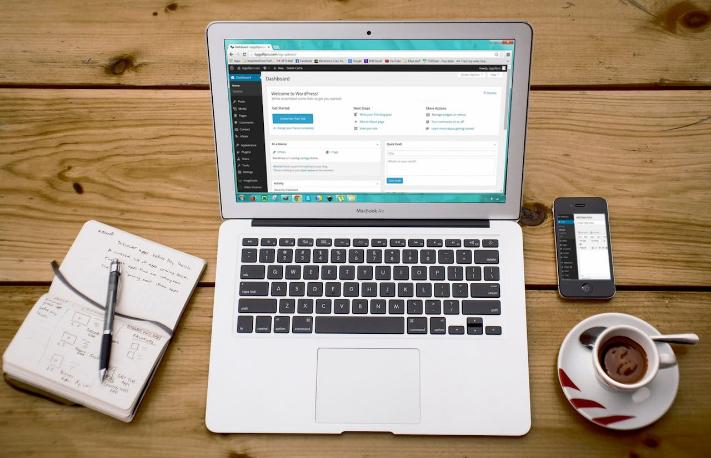WordPress is a PHP and MySQL-based content management system (CMS) that is available for free and open source. It is a popular platform for creating websites and blogs, with a market share of over 43% of all websites on the internet.
WordPress started as a simple blogging platform in 2003. Over the years, it has evolved into
a powerful CMS that can be used to create a variety of websites, including:
- Blogs: WordPress is still a popular platform for creating blogs, with its easy-to-use interface and powerful features.
- Websites: You can use WordPress to create any type of website you can imagine, from simple landing pages to complex e-commerce stores.
- Portfolios: WordPress is a great option for showcasing your work, whether you’re a photographer, designer, or artist.
- Online courses: WordPress can be used to create online courses, with features like quizzes and assignments.
- Membership sites: You can use WordPress to create membership sites with exclusive content for paying members.
Why choose WordPress?
Selecting WordPress for your website makes sense for a number of reasons:
- Easy to use: WordPress is known for having a user interface that is simple to use. Even if you have no technical experience, you can easily create and manage your website.
- Open-source: WordPress is free to use and modify. This means you have complete control over your website and can customize it to meet your specific needs.
- Flexible: WordPress is a very flexible platform. There are thousands of themes and plugins available that can add new features and functionality to your website.
- Secure: WordPress is a secure platform. The WordPress core is constantly being updated to fix security vulnerabilities.
- Large community: The WordPress user and development community is large and active. This means you can easily find help and support if you need it.
Getting started with WordPress
Getting started with WordPress is easy. A web hosting account and a domain name are all you need. Once you have those, you can install WordPress in a few minutes.
Follow these simple steps to get started:
- Choose a domain name and web hosting provider.
- Install WordPress.
- Choose a theme.
- Install plugins.
- Start creating content.
WordPress features
WordPress comes with a variety of features that make it easy to create and manage your website. Some of the most important features include:
- Content management system: WordPress allows you to easily create, edit, and publish content.
- Media library: Organize and upload photos, videos, and other types of files.
- Comments: Allow visitors to leave comments on your posts.
- Categories and tags: Put your content in tags and categories.
- Menus: Make menus that help users in navigating your website.
- Widgets: Add widgets to your website’s sidebars and footers.
- Themes: Change the look and feel of your website with a new theme.
- Plugins: Add new features and functionality to your website with plugins.

Important things to know about WordPress
- WordPress is Open-Source and Free:
This means anyone can use, modify, and distribute the software for free. This makes it a popular choice for individuals and businesses who want to avoid the cost of proprietary software.
- WordPress is Easy to Use:
Even if you have no programming experience, you can easily create and manage your website with WordPress. The interface is user-friendly and intuitive, and there are many resources available to help you get started.
- WordPress is Flexible:
WordPress can be used to create any type of website you can imagine. There are thousands of themes and plugins available that can add new features and functionality to your website. Whether you want to create a simple blog, a complex e-commerce store, or anything in between, WordPress can be customized to meet your needs.
- WordPress is Secure:
The WordPress core is constantly being updated to fix security vulnerabilities. However, it is important to take steps to secure your website, such as using strong passwords, keeping your software updated, and backing up your website regularly.
- There’s a Big and Active Community on WordPress:
The WordPress user and development community is large and lively. This means you can easily find help and support if you need it. There are many forums, websites, and social media groups where you can ask questions and get help from other WordPress users.
- WordPress Requires Regular Maintenance:
Like any software, WordPress requires regular maintenance. This includes updating your themes and plugins, backing up your website, and running security scans.
- WordPress Can Be Scalable:
WordPress can be used to create websites of all sizes, from small blogs to large e-commerce stores. As your website grows, you can easily add more features and functionality with themes and plugins.
- Choosing the Right Hosting is Important:
Your web hosting provider plays a crucial role in the performance and security of your website. Choose a reputable web hosting provider that offers WordPress-specific hosting plans.
- Back Up Your Website Regularly:
Regularly backing up your website is important in case any data is lost. There are many plugins available that can help you automate this process.
- Keep Your WordPress Core, Themes, and Plugins Updated:
Keeping your WordPress core, themes, and plugins updated is important for security and performance. WordPress automatically notifies you when updates are available.
- Use Strong Passwords:
To prevent unwanted access to your website, you must use strong passwords. Use a mix of upper and lowercase letters, numbers, and symbols.
- Secure Your Login Page:
Hackers often target for the login page. Use a strong password for your administrator account and enable two-factor authentication for added security.
- Be Careful with Plugins:
Plugins can add great functionality to your website, but it is important to choose them carefully. Only install plugins from trusted sources, and disable or delete any plugins you are not using.
- Optimize Your Website for Search Engines:
Search engine optimization (SEO) is important for getting your website seen by potential visitors. There are many plugins and tools available to help you improve your website’s SEO.
- Promote Your Website:
You must advertise your website after it is live in order to increase visitors. There are many ways to do this, such as social media marketing, search engine optimization, and paid advertising.
Conclusion
WordPress is a powerful and versatile platform that can be used to create any type of website you can imagine. If you’re looking for a user-friendly and flexible CMS, WordPress is a great option.
Read Also: What are the Most Popular Blog Topics in 2024?
FAQs
Basics
What is WordPress?
WordPress is a free and open-source content management system (CMS) for creating websites and blogs.
Is WordPress free to use?
Yes, WordPress itself is free to use. However, you will need to pay for a domain name and web hosting.
Do I need any coding experience to use WordPress?
No, you do not need any coding experience to use WordPress. It is a user-friendly platform with a drag-and-drop interface.
Installation and Setup
How do I install WordPress?
WordPress can be installed in two major ways:
Through your web hosting provider’s control panel (easiest)
Manually
What are the minimum requirements for running WordPress?
- PHP 7.4 or higher
- MySQL 5.6 or higher
- HTTPS support
Themes and Plugins
What are themes?
A website’s theme controls how it looks and feels. You can choose from thousands of free and paid themes.
What are plugins?
Plugins add new features and functionality to your website. Thousands of paid and free plugins are available.
How do I install themes and plugins?
Plugins and themes may be installed directly from the WordPress dashboard.
Content Management
How do I create pages and posts?
You can create pages and posts using the built-in WordPress editor.
How do I add images and videos?
You can add images and videos by uploading them to your media library or embedding them from another website.
How do I create menus?
You can create menus using the built-in WordPress menu editor.
Security and Maintenance
How do I keep my WordPress website secure?
There are several things you can do to keep your WordPress website secure, such as using strong passwords, keeping your software updated, and backing up your website regularly.
How do I maintain my WordPress website?
There are several things you can do to maintain your WordPress website, such as updating your software, backing up your website, and monitoring your website for errors.
Read Also: How to Start a Blog? 10 Tips to Starting a Successful Blog
Read Also: 10 Best Free WordPress Themes (Tested)
Read Also: 3 Best WordPress Security Plugins
Read Also: Best WordPress Contact Form Plugins
